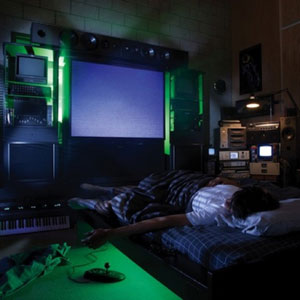Ford & Lopatin Channel Pressure
Remember when M83 released Saturdays=Youth, and everyone talked about how it was the perfect soundtrack […]

Remember when M83 released Saturdays=Youth, and everyone talked about how it was the perfect soundtrack to an imaginary Molly Ringwald film made 20 years hence, one that distilled the delicate piano scores and electro-lite vibes of suburban-Illinois heartache into immaculate, hazy pop suites? Fast-forward three years, and you’ll find
Ford & Lopatin (the Brooklyn duo of Tigercity’s Joel Ford and Oneohtrix Point Never mastermind Daniel Lopatin, previously known as Games) mining a similar landscape, but with entirely mixed results.
To be fair, their debut full-length, Channel Pressure, like past efforts from Oneohtrix Point Never, is a concept record, so some allowances are to be made for thematic indulgences (to quote the LP’s press materials, it’s “a loosely knit epic involving a teenage anti-hero, violent robo-jocks, and a record industry run by a super-computer”)—but they shouldn’t come at the expense of the music. This is the kind of album with two distinct sides: one that comes off naturally and elegantly in its pursuit of improv-based digital and instrumental music (Chick Corea-style fusion jazz seems an obvious touchstone), and one that struggles to find its place among vocal-based electronic pop. Where the record’s title track nicely pulls together a Reagan-era synth bass, some really ’80s-sounding pop-guitar licks, and light, washy pads into a tasteful, laid-back electronic-pop head-nodder, its follower, “Emergency Room,” takes an almost Oingo Boingo tack, with loads of kitschy bleeps and bloops, posi-sounding major-key melodies, and “I AM A RO-BOT”-type vocals. The record continues on in this push-pull trajectory, pitting every intricately arranged instrumental (like, say, the icy “New Planet”) against an ’80s pop-R&B vocal track so cheesy it’d make Chromeo blush (the super-hokey “Too Much MIDI (Please Forgive Me),” for instance).
Something happened in the shift from Games’ That People Play EP to Channel Pressure. That welcome looseness was lost in lieu of Ford & Lopatin’s more focused and (dare we say) over-thought songwriting and production, and it’s as if there are too many cultural cues being thrown our way this time around. We get the joke: We, too, love Jimmy Jam and Terry Lewis productions, Electric Dreams, Alphaville, freestyle, OMD, Weird Science, and the whole bit, but ironically, it’s those time-stamped classics’ lack of self-awareness—in contrast to Ford & Lopatin’s referential, over-studied approach—that made them great. Channel Pressure, too, feels dated, but not in a good way.

